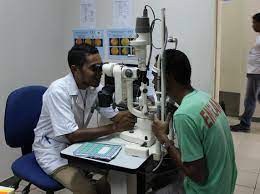Building Sustainable and Efficient Eye Programs in Timor Leste - What we found
Blindness and vision impairment are major public health issues. Approximately 85% of blindness in Timor-Leste is avoidable.
 The Royal Australasian College of Surgeons (RACS) has been working with local partners and international donors and volunteers to reduce preventable blindness in Timor-Leste and build a sustainable, self-sufficient and effective eye health system through a series of projects over twenty years.
The Royal Australasian College of Surgeons (RACS) has been working with local partners and international donors and volunteers to reduce preventable blindness in Timor-Leste and build a sustainable, self-sufficient and effective eye health system through a series of projects over twenty years.
Dr Kris Hort and Ms Andrea Boudville, recently completed an evaluation of the RACS East Timor Eye Program (ETEP) to give an independent assessment of program's progress. The Nossal Institute researchers conducted interviews with eye care providers, donors and eye care specialists in Timor Leste and Australia.
Kris and Andrea were able to provide evidence of the program’s significant contribution to developing the eye care services in the country. About 70% of blindness in Timor Leste is caused by cataract and about 33% of visual impairment is from uncorrected refractive error. These conditions can be easily addressed through surgery and provision of glasses, allowing increased social and economic participation not just for the elderly, but all household members. The evaluation found that successive iterations of the program have progressively built the eye care system, beginning with training East Timorese eye specialists, followed by establishing a national eye care referral centre, which enabled the provision of training programs for East Timorese eye care staff, and which in turn has enabled the development of district and community level services.
The research team noted key achievements of the program have been built on the foundations of understanding the eye care needs of the population and a clear long term vision for how the eye care system could be progressively developed. The evaluation identified future challenges and provided recommendations to the ETEP around the next key step of transitioning management of the program to the Ministry of Health and local partners. Overall, the ETEP provides a great example of how coordinated support from development partners, guided by a long term systematic program, can build a sustainable health system capable of delivering even complex services requiring a high level of skill and technology.
Nossal Institute’s Health Systems Governance and Financing team support the development of strong health systems governance and financing in Asia and the Pacific to enable countries to adapt to changing health needs and improve equity in the distribution of and access to health services.